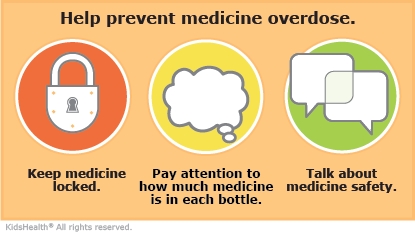Taking too much cough and cold medicine can lead to serious health problems. The health care team checked your child for any problems and treated them, if needed. Your child is now ready to go home. This is a good time to review how to store and give medicines safely.

Home Care
- Your child can eat a regular diet.
- If your child is under 6 years old, do not give cough and cold medicines to your child. They can have serious side effects in young kids.
- If your child is over 6 years old, don't give cough and cold medicines again until your health care provider says it's OK.
- If your child took the medicine on purpose, follow up with a psychiatrist, psychologist, or counselor as recommended by your health care provider.
Preventing Medicine Overdose
- Give medicines safely:
- Follow the package directions for how much medicine to give and how often.
- If the medicine comes with a dropper or cup, use that to give the medicine.
- For medicines you will give more than once, or when giving more than one medicine, write down or note on your phone the name and dosage of the medicine and the time you gave it.
- If you give more than one medicine, be sure they don't contain the same ingredients. For example, some cough and cold medicines contain acetaminophen, so giving your child more acetaminophen along with them can be dangerous.
- Don't call medicine "candy" when trying to get your child to take it.
- Store medicines safely:
- Keep all medicines (even those you can buy without a prescription), in a locked cabinet, out of the reach of children.
- Put medicines away after giving a dose.
- Keep purses and handbags that might contain medicines away from kids.
- Make sure the lids to all medicines are tightly closed.
- Always keep medicines in their original containers.
- Keep track of how much medicine is left in a bottle. You can write the date on the label and the number of pills or draw a line at the level of liquid medicine.
- Know about the medicines you have in your home. Get rid of those you no longer need. If you're not sure how to get rid of medicines, talk to your health care provider or visit fda.gov/consumers/consumer-updates/where-and-how-dispose-unused-medicines.

Your child:
- seems clumsy
- is very sleepy
Call 911 if your child is confused, can't be woken, or has a seizure (uncontrolled jerking movements).

What kinds of medicines are in cough and cold medicines? They can contain:
- decongestants (to dry up a congested nose or chest)
- expectorants (to loosen mucus, making it easier to cough up)
- cough suppressants (to relieve cough symptoms)
- pain relievers
Many medicines contain combinations of these ingredients.
What can happen if someone takes too much cough and cold medicine? It depends on what medicine was taken. Some problems from taking too much include extreme tiredness, feeling high, seeing or hearing things that aren't there, agitation, fast heartbeat, slowed or stopped breathing, high blood pressure, seizures, and even coma.
How can a child get too much cough or cold medicine? An adult might accidentally give the wrong dosage or give two medicines that contain the same ingredients. A young child might find the medicine and take it out of curiosity. Because some cough and cold medicines can cause a pleasant feeling, older kids and teens might take too much on purpose, trying to get high.
What should I do if I think my child got too much of any medicine? Call Poison Control right away for advice (800-222-1222). Keep the number posted in your home (for example, on the refrigerator) and put it in your phone contacts.




